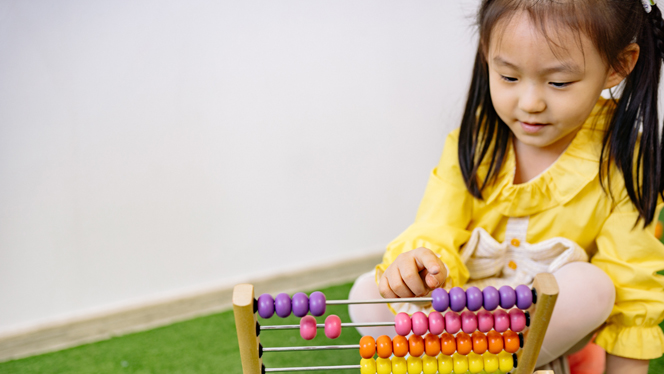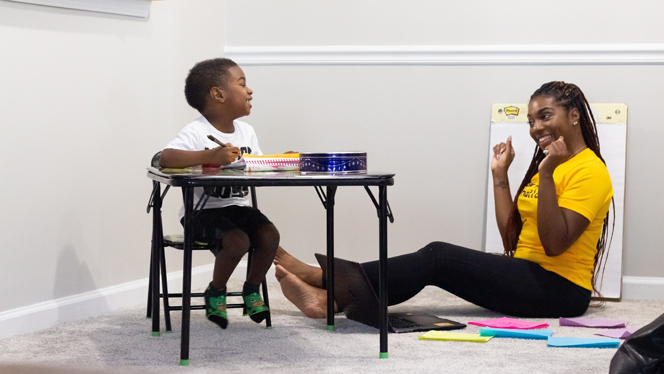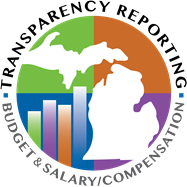
Work math questions into everyday things you do together.
Dean of Special Education and Intervention Megan Dziedzic coordinates a summer learning program for her students. She has advice for parents who need guidance in keeping their children engaged in basic math and reading skills over the summer months.
“Families need to make summer learning work for them. It should not be overwhelming,” Dziedzic said. “Set a schedule, make it a part of the routine. Maybe it’s right after breakfast. Read for 20 minutes, so it’s anticipated and consistent. Be sure to set attainable goals, so that everyone feels successful. Most importantly, make it fun.”

When you are cooking, have your kids help measure things out.
Other suggestions from Dziedzic are:
- Practice math fast facts: fluency is needed at all levels. Have your child practice quick facts while driving, waiting in line, or making a meal.
- Pair reading and writing. After your student is done reading, have them write about their favorite part. Writing is an important skill in every grade.
- Have your student check the time. Telling time is a difficult skill and is not used as often with the popularity of digital clocks.
- Play board or card games as a family. Many games require not only some kind of computation but critical thinking and strategizing that are important to development of math skills.
- To make sure your student is understanding what they are reading, ask questions. Ask about the characters, problem, solution, setting, and encourage details. If your student is having trouble answering these, suggest reading the book together and finding a more “just right” book for independent reading.
Summer learning, or learning in general, can be worked into everyday things you do together.
“When you are sorting clothes for washing, have your kids help, sort by color, count how many items you have to wash,” Dziedzic said. “When you are cooking, have your kids help measure things out. If you are outside, sort rocks by color, or if you see ants, count them. If you are shopping and an item has a 10% discount, ask your student, ‘how much is that?’. Just add it into your everyday activities and casual conversations.”
 Setting a schedule for summer learning and making it a part of the routine can be helpful.
Setting a schedule for summer learning and making it a part of the routine can be helpful.Dziedzic related another idea that has children helping with cleaning chores and doing math. Kids can be asked to do 20 minutes of vacuuming or add up how long it takes them to vacuum different rooms of the house.
Local libraries are great resources for summer learning ideas and programs. So many things are available online, as well. Dziedzic suggests to Google math games for whatever grade your child is, and many possibilities will pop up, most of them free.
Dziedzic just finished her second Summer Learning Program check-in with students who registered for the program. She was able to check on scholars’ progress on Lexia or DreamBox before they arrived, she explained. Or students could bring the Summer Bridge Book, Targeted Learning Book, or Bingo Board for her to see at the event.
Students only needed to do one of these items to get a raffle ticket for prizes and to receive a shaved ice treat. However, students are able to earn extra tickets for each of the tasks they complete. On average, she has had about 100 kids come to the check-ins.
 Dziedzic suggests asking questions of your children to make sure your student is understanding what they are reading.
Dziedzic suggests asking questions of your children to make sure your student is understanding what they are reading.For at-risk students, she emails with them to stay connected and has office hours. She also does things through Google Classroom with students such as posing questions and simply engaging them, so they don’t forget about the Summer Learning Program.
A few last reminders from Dziedzic: “Make summer learning work for your family’s schedule and your student’s needs. Make it simple. Make it fun. Any time spent on summer learning is awesome!”
About Plymouth Scholars
Plymouth Scholars is a tuition-free, public charter school in Plymouth, Michigan, serving students in Young 5s through eighth grade. It is part of the National Heritage Academies network, which includes more than 100 tuition-free, public charter schools serving more than 65,000 students in kindergarten through 12th grade across nine states. For more information, visit nhaschools.com.
Visit Plymouth Scholars's blog to read more stories like this.
